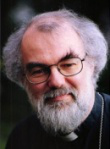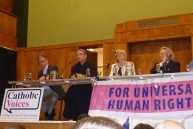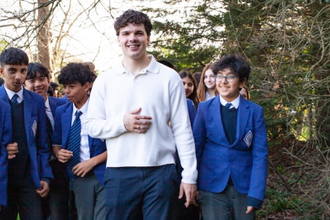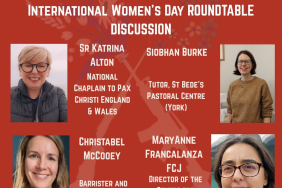Dr Rowan Williams meets AC Grayling

Dr Rowan Williams
The Archbishop of Camterbury, Dr Rowan Williams, discussed with humanist philosopher AC Grayling the latter’s The Good Book: A Secular Bible at the Queen Elizabeth Hall on Wednesday.
A couple of years previously the two had discussed Dr Williams ‘wonderful’ study of Dostoevsky, and this may have had a part to play in the tone of the evening which felt less like a confrontation than a meeting between two mutually respectful friends. Grayling maintains that his own work is not an attack on religion, not least as God is not once alluded to, and Dr Williams made it clear at the outset that he did not see Grayling’s deeply impressive work as being in competition with the Christian Bible.
Indeed the closest the evening came to an attack on religion was Grayling’s admission to being uncomfortable with the phrase “The fear of the Lord is the beginning of wisdom”. Yet Williams maintained that the fear alluded to is not one of servile dread but of awe.
Using the template of the King James Bible, Grayling has drawn on a wealth of non-religious thinking including classical antiquity, Socrates, Confucianism, Aristotle and Spinoza. He maintained that no-one actually needed his book, and that the book’s only injunction is to think for oneself, but that it might function is a useful resource for finding past thinking on morality and on the good life.
What struck Grayling writing his book was how much convergence there was on what constituted the good life. Like his Christian interviewer, Grayling saw awe at the world as a useful entry point, and detected a natural law, seeing human dignity as non-negotiable. Both agreed that anger can be positive when it is disciplined, but that emotions need educating, and that individual happiness lies in living within limits and recognising one’s responsibilities to others and to our environment. As Grayling put it “a person wrapped up in himself or herself makes a very small parcel.” Both saw limitations to the assertion of Sam Harris in his recent book The Moral Landscape that our ethical systems can be deduced from neuro-psychology. Dr Williams felt that Christianity is too often seen as a code of conduct rather than as a means of self-recognition leading towards greater compassion towards others.
Attendees at the event had mixed feelings about the non-confrontational tenor of the discussion. This particular attendee could not help finding some of Grayling’s arguments for a purely secular morality to be less stable than he supposes. Pleasingly he saw the fallacy of the Golden Rule, quoting George Bernard Shaw's: “Don’t do unto others as you would have them do unto you because they may not like it.” He saw the UN Declaration of Human Rights to be one of the great documents of history, and the (denied) endorsement by US science czar John Holden of forced sterilisation as “council(s) of despair”. speaking about the hospital Broadmoor he cited the case of an exceptionally violent inmate under 24/7 supervision to stop him harming himself or others. Grayling observed that many people would be inclined to let the man kill himself, but it is to society’s credit that social bodies exist to mediate against such urges.
The allusion to Broadmoor seemed particularly apt as it had been discussed on Radio 4 that very morning, but it is worth noting that also that same morning 8,000 disabled people had marched in Central London demanding not so much an improvement in the sometimes quite meagre quality of their lives but that it was not lowered any further. The non-involvement of Christian organisations in the disability march is lamentable but arguably sets limits on Grayling’s optimism and suggests that Jesus’ commitment to the least of humanity may be just as radical today as in his own time.
















